Internet users are increasingly dividing themselves on the subject of NFTs. While some groups actively participate in the space, not everyone is convinced about its viability. On top of that, due to increasing scams, many believe NFTs are nothing but a pyramid scheme.
NFTs are not a pyramid scheme, they are digital assets that can provide real-world value and utility to holders in various ways such as access to events, physical products, contracts, and more. However, some scammers might structure their NFTs similarly to a pyramid scheme.
The recent unrest over NFTs has produced a lot of confusion. Why is it that so many people think NFTs are a scam even though they involve legitimate blockchain technology? Part of the reason is it’s fairly new, and it does have a slight resemblance with pyramid schemes. Would it be fair to label them as a pyramid scheme because of that? Keep reading to learn more.
What is a pyramid scheme?
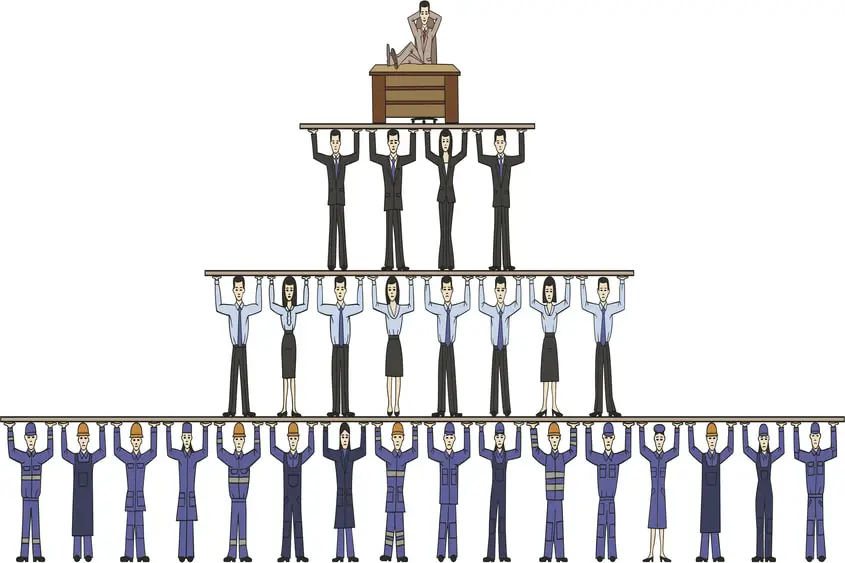
A pyramid scheme is a business method that recruits members promising money or benefits in exchange for recruiting others into the scheme. It doesn’t involve the sale of goods or services.
When someone joins a pyramid scheme, they are at the bottom of the pyramid. They get paid a little on the basis of successfully compelling others to join the scheme. However, individuals at the top of the pyramid receive a significant profit as people keep signing at an exponential rate.
Unlike pyramid schemes, if you want to obtain an NFT, you have to buy the asset yourself.
Are NFTs a pyramid scheme?
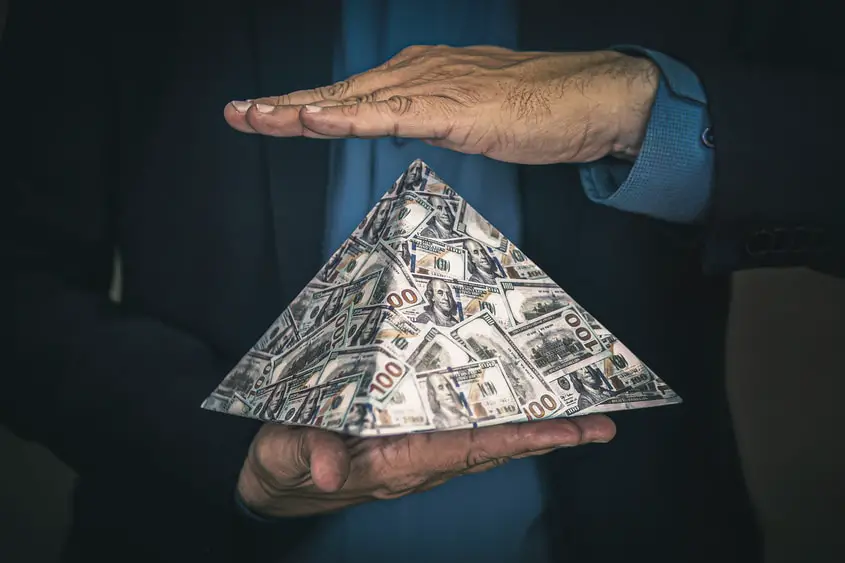
Dealing with NFTs is the same as purchasing and selling cryptocurrency. You may get them for their present usage as a simple new form of transaction, popularity, or investment and anticipate their future value.
But NFTs are not limited to the idea of investment. NFTs are a new way of thinking about digital ownership, digital scarcity, and this paradigm shift is changing the world, one asset at a time.
NFTs serve as a kind of digital asset ownership evidence. When someone buys an NFT from its creator, they may choose to keep it, or they may decide to resell it immediately, or perhaps at a later time.
When the buyer resells it to someone else, the original creator receives a royalty (for example, 5%) from that sale. The buyer doesn’t receive anything like that—the buyer depending on their position—either profits or experiences a loss. The original creator keeps getting a royalty each time that NFT is resold. However, this is dependent on the smart contract’s established publicly accessible conditions.
Creating an NFT also means creating a smart contract. This contract dictates royalty issuing and is also needed when the exchange of NFTs takes place between creators and buyers.
Since NFTs are based on blockchain technology, whatever someone buys is recorded on a digital ledger accessible by the public. The transactions are open to all, making it far from being a pyramid scheme.
Resellers receive small percentages in a pyramid scheme. The rest (most money) goes to the top of the pyramid. The flow of funds is entirely non-transparent here.
To illustrate, assume you have a BAYC NFT. You tell a friend about it, and they buy it. Unlike a pyramid scheme, you will not get any money for telling your friend about the BAYC or for them to buy it. Additionally, if you recruit someone to buy an ape with the same characteristics as a BAYC line, it won’t raise the price of that ape.
NFTs can also have value. For example, people can use them to access special events or get items only available to people who have the NFT. A pyramid scheme has no such value.
Are NFTs a con?

Being conned is unfortunately not uncommon in the financial and digital world. Internet users have seen everything, from well-known ponzi schemes and phishing to lesser-known scams.
Due to the decentralization of blockchain technology and the difficulties of liquidating cryptocurrencies, the NFT market has faced scams and backlash. So it’s normal to think of NFTs as a con.
Casting a negative light on NFTs because of this misrepresentation is entirely unfounded. The NFT market wouldn’t be growing this much if it were all a con. But it goes without saying that emerging people are sometimes taken advantage of since the technology is new and all.
Newcomers looking to get into NFTs face the challenge of understanding the validity of an NFT project. This is not always straightforward. Due to this, beginners become easy targets for exploiters. A solid investment in the NFT space must have a competent team, proven leadership, and sufficient funds.
Although OpenSea disclosed that over 80% of the NFTs created using their free creation tool were found to be fake, classified as spam or frauds. Not all NFT projects are cons.
On OpenSea or other NFT marketplaces, look for the blue checkmark next to the artist’s profile to identify if your NFT is genuine. Or try finding the artist digitally if there isn’t one and identify their social media presence. According to CoinDesk, you should ask the creator directly if the project you wish to buy is theirs and if you have the necessary user profile.
While you may be correct in thinking NFTs are a con, I would look at big corporations and their aspects of NFTs. Brands like VeeFriends hold their presence in the NFT market, offering real utility to all its holders.
So are NFTs legit?
NFTs are a legit technological platform that offers users a way to prove ownership of both physical and digital assets while enabling creators to supply additional value to holders of their NFTs. Similar to social media, NFTs simply add an additional form of marketing and offerings, with complete transparency.
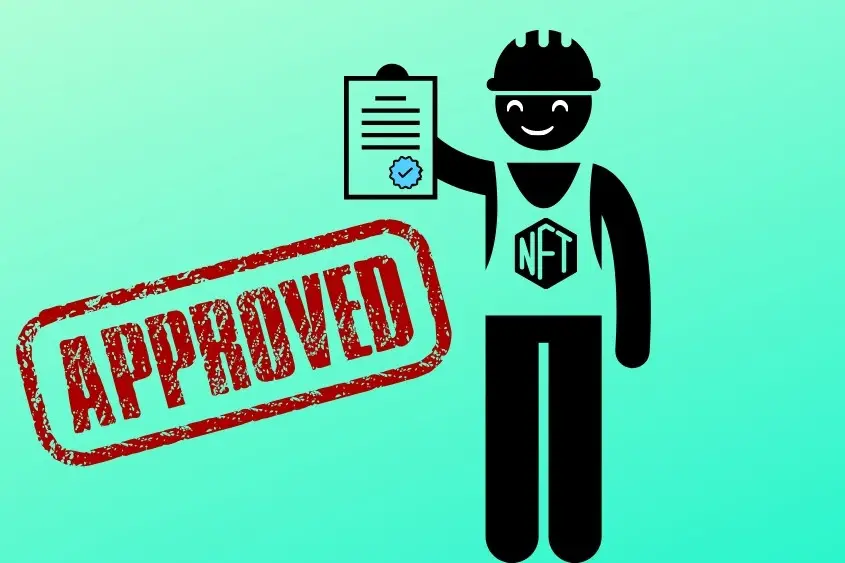
According to Markets Insider, blockchain research company Chainalysis estimated the market for NFTs to be worth $41 billion in 2021.
Mainstream corporations are also immersing themselves in the technology:
- Under Armour has developed a line of NFTs inspired by the sneakers worn by Stephen Curry.
- Adidas collaborated with BAYC to create NFTs that grant consumers unique access to real-world merchandise, among other benefits.
- Nike obtained RTFKT, a company that only develops NFTs and shoes for the metaverse.
As with any financial decision, do enough research before investing in NFTs. Not only on the one you’re looking to get but also in the NFT industry.
Always check wallet history and transactions before buying. Don’t interact with random links from social media or Discord. Always try to Look for the seller’s unique qualities and verification, liquidity and market volume economics, historical pricing performance of the seller’s suite of NFTs, and the marketplace’s reliability.
Should you buy an NFT?
NFTs are owned digitally. Therefore no one can forcibly take them from you. Even if hackers took your NFTs, those NFTs would generally be blacklisted on the blockchain.
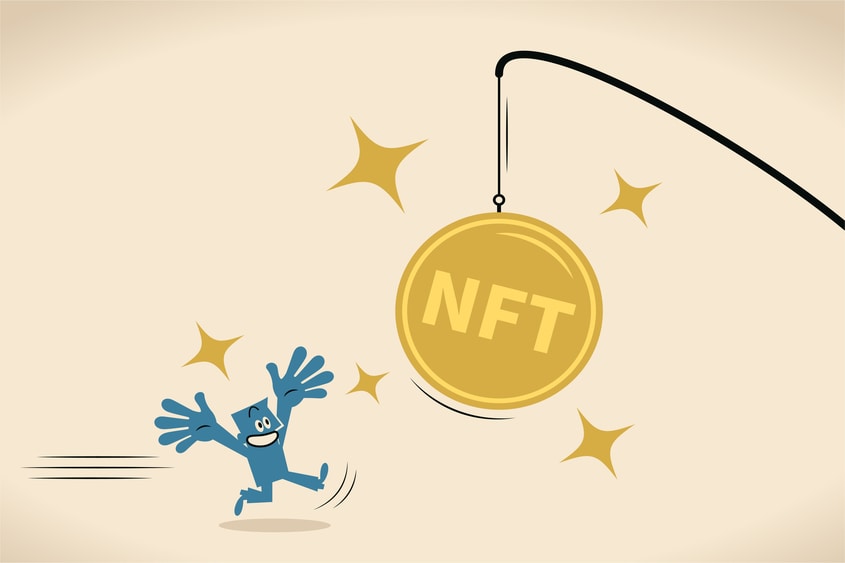
You should only buy an NFT if you understand the technology and have done your own research on the specific NFT you are considering buying. Otherwise, you are more likely to become a victim of a scam.
If you do your homework and understand how NFTs work, they can be a good investment. Owning an NFT is similar to owning an investment or an art collection while also being an exclusive community member.
It’s funny, though.
To be clear, NFTs exist as an additional layer of technology—another platform—that’s not to say that certain things wouldn’t exist without NFT technology. NFTs simply enhance things we already know and love in today’s world.
Obviously, we don’t need NFTs to buy and sell products online, and some people have even successfully sold digital products online, but without proof of ownership, there was no way to create scarcity of these digital assets.
Now, considering people value digital things such as a blue checkmark on Twitter or a Fortnite skin, along with various other digital assets, NFTs simply give us a way to prove this ownership, as well as a market to buy and sell such assets.
See, what NFTs truly give us is a way to prove ownership of something digital, whereas before, that proof didn’t exist. Also, smart contracts allow automatic transactions as well as digital products that can change over time. These are some new features that NFTs offer us, that didn’t exist before the technology.
Ultimately, how we view NFTs today is not how we will view and utilize them in the near future. Art was an easy way to introduce such a mind-boggling new technology, and many people get stuck on the fact that NFTs are only art, or NFTs are just JPEGs with no real value.
You can give anything value if your build a brand around your product, it’s no different with NFTs. Why do people prefer to wear a white Nike shirt over a generic Fruit of the Loom white tee? Brand. Why do people drive luxury cars over something more affordable? Brand.
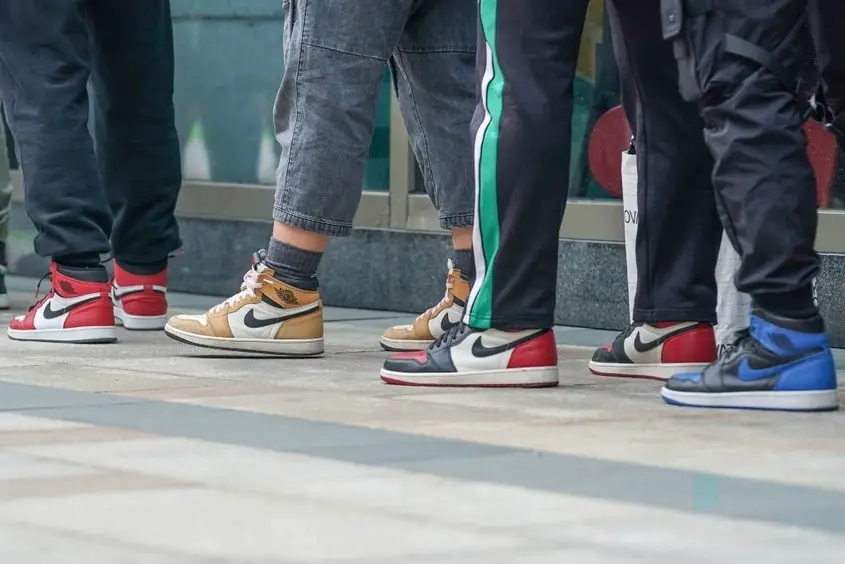
Point is, don’t hate the technology if you haven’t put in the work to understand it. And sure, some NFTs are scams. Well, so are some websites, but that doesn’t mean all websites are scams, right?
Final thoughts
While NFT projects can appear to be like a pyramid scheme, and some might even be a scam, the fact is that not all NFTs are a scam. It’s up to you as the consumer to do your own research before spending your money.
You wouldn’t buy a car without researching its’ history first, would you?
